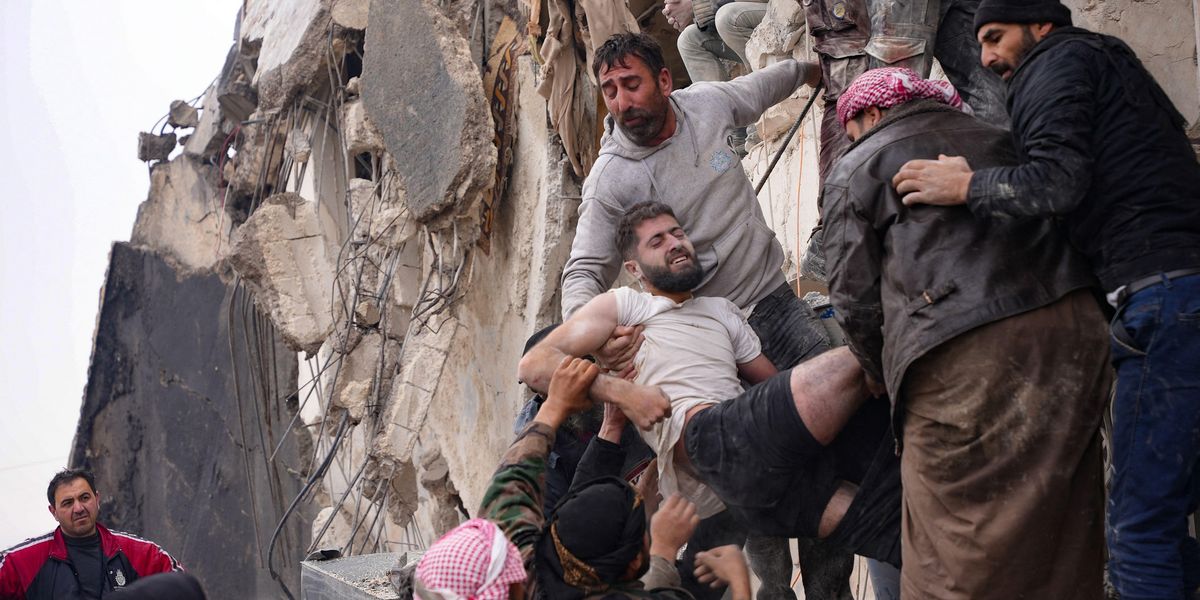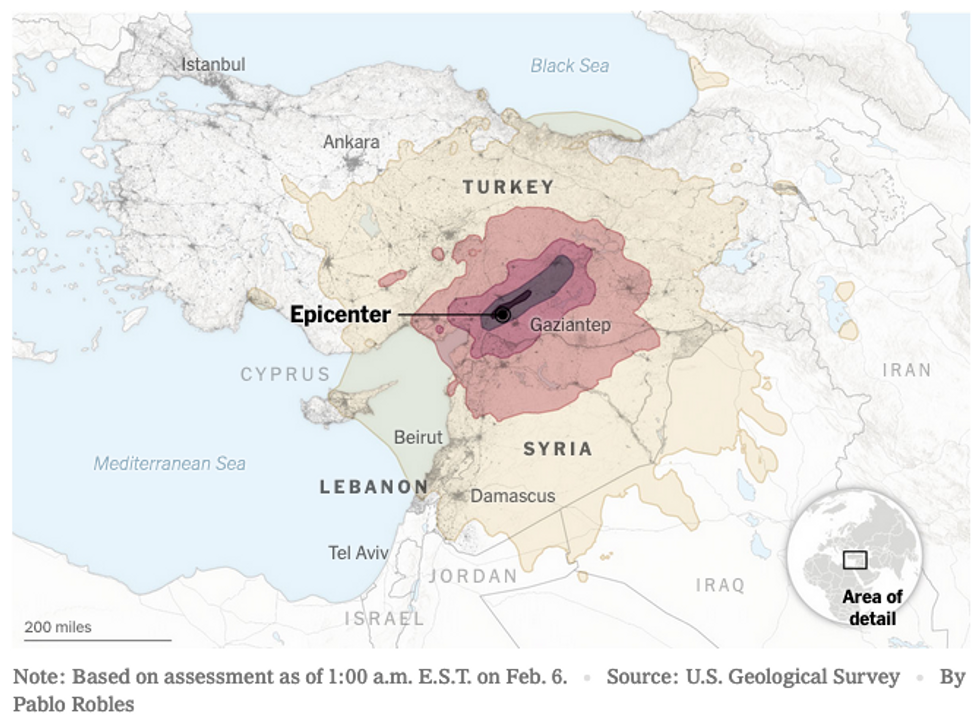Canary guest writers Koçer Nurhak and Vala Francis bring us an exclusive report on the situation in Kurdish areas of Turkey after the recent earthquake.
On Monday 6 February, a 7.7 magnitude earthquake struck the city of Pazarcık in the Maraş region of north Kurdistan, south-east Turkey. It was followed by a 7.6 magnitude earthquake in Elbistan, in the same region, several hours later. Hundreds of aftershocks have continued to hit the area. At the time of writing (Monday 20 February), another two earthquakes registering 6.4 and 5.8 magnitudes struck Hatay, a badly damaged southern city on the border with Syria. They brought down many of the buildings still standing after the first two earthquakes, and trapped more people underneath collapsed buildings. Together, the earthquakes have killed over 46,000 people. Tens of thousands of people are still unaccounted for. Collapsed and severely damaged buildings have displaced millions more.
People have expressed widespread condemnation of the state amid the aftermath. This is directed at its misuse of billion of dollars in earthquake relief funds, as well as not ensuring buildings meet essential regulation requirements. There is also far-reaching anger at the delayed response by state aid agency AFAD (Disaster and Emergency Management Presidency). On top of this, the Justice and Development Party (AKP)-led Turkish government has arrested construction contractors as it seeks to recover a damaged reputation before elections in May.
However, the situation in Kurdish areas of Turkey is particularly dire. The Canary spoke to people on the ground in Kurdish villages in the area. One contact in the region told us that the government’s approach was not just “mismanagement” but “intentional murder on a mass scale”.
Elbistan: a history of Turkish colonial violence
When discussing the recent earthquakes, there is important historical context. Elbistan, the epicentre of the second earthquake in south-eastern Anatolia, is geographically and culturally split. On one side are Turkish Sunni Muslims, and on the other are Kurdish Alevis, who follow a Zoroastrian faith. Both the town and surrounding villages are divided between east and west. Kurdish villages are spread through flat plains and the steep Nurhak mountain across the eastern side of the district. In higher altitude areas, snow remains all year round. The hard-to-reach mountain range is a strategic ally to decades of revolutionary groups.
Decades of religious and ethnic persecution by the Turkish state have led to massive displacement of the Kurdish Alevi population. Huge numbers have fled to Europe after violent massacres. In England and Scotland, up to 70% of the Kurdish diaspora is Alevi, with many families originating from Elbistan. The systematic underdevelopment of the Alevi areas in Elbistan is stark: the tarmac disappears when driving from one Turkish village off the central highway to a Kurdish Alevi village. Unsurfaced roads connect most such villages.
The Maraş massacre
The trauma of the earthquake sits atop layers of painful history in Alevi areas. The Maraş massacre took place in 1978, and it stands in living memory as testament to the Turkish state’s genocidal policies. Far-right Islamic nationalists, including those connected to the paramilitary Grey Wolves of the MHP Party (Nationalist Movement Party), killed between 100 and 500 people. Neighbours killed their neighbours, with many victims knowing their attackers. Groups went house to house, raping and murdering Kurdish Alevi women and men with particular brutality. People cut unborn children out of their mothers and tortured the elderly.
The MHP party still rule as part of today’s coalition government, and the forced migration of Kurdish Alevi people in Elbistan and Pazarcık goes on.
Now, the state is using the earthquake as an opportunity to complete this policy. Every Kurdish Alevi person whose family is from Elbistan feels that their home is in Elbistan, even if they live on the other side of the continent. They feel like strangers elsewhere. Now, however, it’s unclear what they would return to.
A slow response from Turkey
The Canary spoke to a volunteer from another city in occupied North Kurdistan, situated within south-eastern Turkey. As voices critical of the government are met with serious retribution by the state, we have kept his details anonymous. After contacting AFAD and receiving no response, he contacted one of the Peoples’ Democratic Party’s (HDP) crisis coordination centres four days after the earthquake. They sent him to Elbistan. He told us:
Kurdish people from all over Bakûr (north Kurdistan) have come to help, as well as a group from the diaspora in Europe.
The first day we arrived, we were really affected psychologically. We thought maybe a few houses had fallen, but actually in some streets, no buildings are still standing. At least 30,000 dead bodies haven’t been recovered from beneath the rubble in Elbistan. The families who haven’t found their loved ones bodies don’t want to leave the city without them.
State organisations across the region have responded slowly. Often, they aren’t even present.
Authorities seizing earthquake aid
The Turkish military has maintained its position of war against the Kurdish people throughout the relief efforts. Military and other state forces seized trucks filled with aid, or otherwise blocked them from reaching their destinations. They didn’t deploy for search-and-rescue operations during the first 72 hours, for example, which is the most critical period for finding living victims of an earthquake.
Nonetheless, unionised workers, students, activists, and people from across society are connected to civil structures in the Kurdish regions and across Turkey. And they have worked with the HDP to advance independent relief efforts. The volunteer told the Canary:
Clothes, food, women’s hygiene products, blankets, tents – all the aid that came to Elbistan is from the HDP crisis coordination centres, which exist in every city where HDP has a strong presence. They’re collecting the donations and resources from society, here and around the world.
Even Turkish Red Moon only has a few tents in the town centre, giving soup to the people. Some of the villages are very far, there’s no tarmac roads, and there is snow – we could reach them once or twice but not return because we don’t have suitable vehicles.
However, survivors of the earthquake and volunteers face harrowing conditions.
A perilous situation in Turkey
The volunteer told the Canary of a video from Elbistan that showed a woman’s body on the side of the street, frozen and covered in snow. While many people survived the initial earthquakes, they died before rescue because of a lack of machinery and resources. However, the state is now using heavy machinery to clear away the rubble – including bodies that rescuers could not reach. “No-one knows where they are taken,” the volunteer said.
He added:
There are very strong aftershocks in the night. A couple hours ago there was a 5.5 magnitude tremor. 90% of people here are staying in tents now, but they are returning to the damaged buildings to stay warm. At night the temperature goes down to -20C. We know that if we sleep in the damaged buildings, if it collapses, then we wont be rescued for days. So when we sleep, we wear several jackets, layers of socks, and blankets to keep ourselves warm.
Cholera and scabies transmission has already started. So we are not using tap water due to the cholera. The survivors need food and medicine.
The government announced a three-month state of emergency in the ten affected regions. This was allegedly to better respond to the disaster, and also to quell unrest and ‘looting’. People from Bakûr told the Canary that the government really made this decision to enable military control of society there, as it allows the government to make decisions without proper democratic procedure. It has made similar decrees close to previous elections, from the 1980 military coup to the 2018 election.
Continuous crackdowns
Previous local and general elections saw the HDP receiving numerous positions in local and national governance. In response, the state replaced its elected officials with so-called ‘trustees’ – kayyim – and stripped many HDP MPs of parliamentary immunity. People do not elect Kayyims as officials. Therefore, normal regulations do not hold them accountable. As a result, in south-east Turkey they have expropriated millions in funding. They are also used as a tool to eradicate the democratic process in regions they oversee.
Meanwhile, policies of arbitrary detention and military intimidation constrict life in north Kurdistan and across Turkey. Even in the immediate aftermath of the earthquake, the state arrested left-wing and Kurdish journalists as part of its continuous crackdown on critical voices.
The volunteer told the Canary:
A big problem is that Pazarcık has had a kayyim installed on the 16 February.
Pazarcık is the central coordination point for the surrounding areas – including Elbistan. The volunteer said that the supply of food has now run dry, with:
only enough to feed volunteers remaining – there isn’t enough for all of the survivors.
They [the government] are seizing the aid that has already been accumulated by the crisis coordination and civil society structures to redistribute under their own [AKP’s] name. We don’t know who they will give it to, and we don’t trust that it will be given at the needed time, especially to Alevis. So we are hiding some vital resources, like food, in our own tents to redistribute.
The aid coming from different countries is getting AKP stickers and Erdogan’s face printed on them to give an impression that the state is organised and is helping the people. It’s a form of psychological warfare and manipulation.
The above tweet reads: The police attacked the statement that was intended to be made in front of the HDK (People’s Democratic Congress) office regarding the appointment of the kayyim to the HDP crisis coordination centre in Pazarcık. In the video, people are saying: (Women) “This murderous state will be held accountable. You killed our people”. (Police) “We know who killed the people. You cannot say the state is murderous. Shame on you”. (Crowd) “We resist and we win!”
Earthquake relief is bound up by political suppression
The long-term consequences of the earthquake are bound up with the political suppression of society. Survivors have barely begun reconciling their unbearable grief. Yet they already have to face the state’s occupation within Turkey, and across the fragmented borders and political terrain of northern Syria, preventing resources from reaching those that need it. This is part of the government’s bare-faced and unaccountable corruption.
Nonetheless, volunteers are persistent in their efforts. The Canary‘s contact in Elbistan told us that, soon, he would go home to rest for three days. Then he will leave again, to wherever the HDP tell him help is needed. In his place, another group from another region of Kurdistan will come to help.
Organisation is the cornerstone of society in northern Kurdistan. It has persisted throughout devastating crises, mobilising networks of aid prior to and immediately after the earthquake. But the road to rebuilding homes and infrastructure, as well as autonomy in a social and political sense, is arduous. This is just the beginning.
The volunteer told the Canary:
In the town, when the Turkish people saw that we are calling each other “heval” [‘friend/comrade’ in Kurmanci], that we came from Botan [a south-eastern region], they started calling us ‘terrorists’. But we already agreed before hand that we would continue to support people regardless of the reactions against us for being Kurdish.
Kurdish people need our solidarity
From Europe, send donations to Heyva Sor a Kurdistanê (Kurdish Red Crescent) via PayPal here. This money will reach people on the ground in the most effective way possible. Financial support to on-the-ground groups are the most immediate need. However, after that, solidarity will be necessary. Kurdistan and the peoples of Turkey and Syria will require grassroots and institutional solidarity against the Turkish state’s militarism and fascism.
Featured image via T24 – YouTube
By The Canary
This post was originally published on Canary.





 Last November the UN called on states to lift "catastrophic" sanctions on
Last November the UN called on states to lift "catastrophic" sanctions on 


 Watch our Daily Review:
Watch our Daily Review: NEW
NEW